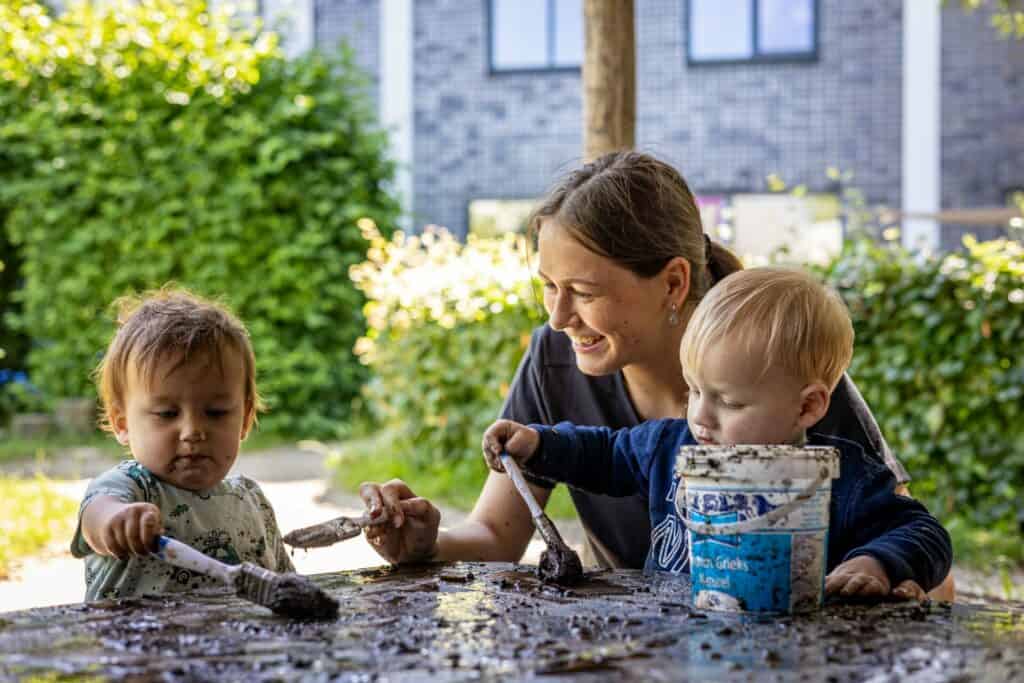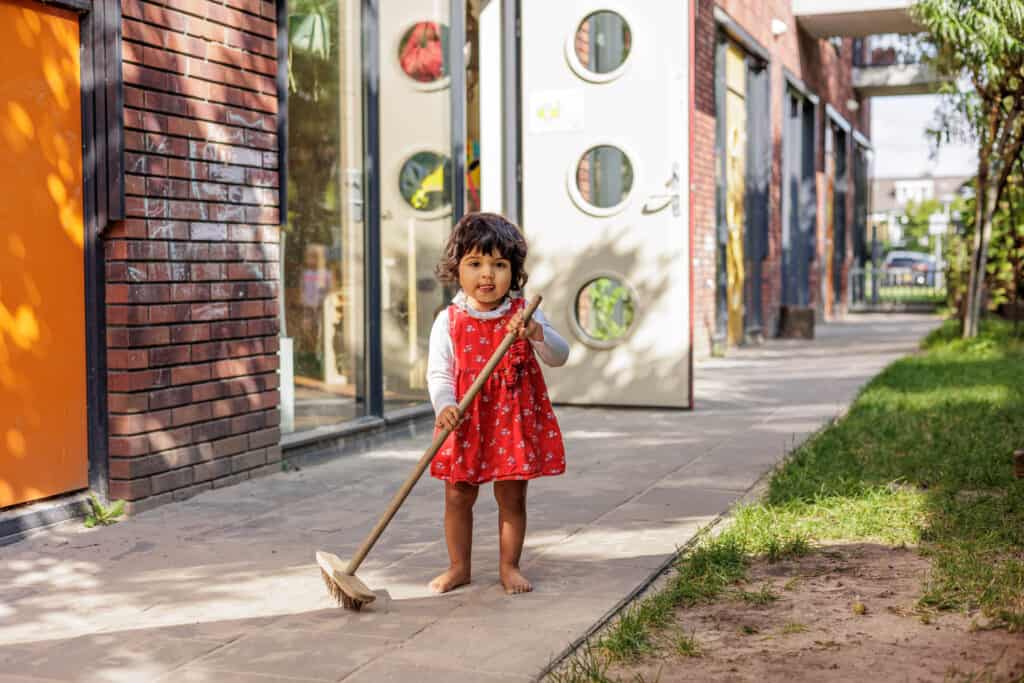Your child is 1 – 1.5 years old
The timeline below shows the key milestones in your child’s development during this age. We should like to tell you about the things children experience in each developmental area and, of course, we also want to explain how we respond to this at KinderRijk.
Learn more about…

1. Motor skills
Your child develops amazingly fast at this stage with regard to his motor skills. The main challenges here are in learning to walk completely alone. On average, children start walking alone from around 13 months. By walking independently, children literally enlarge their world. They experiment with all the things their bodies are capable of and will also learn to run, climb and jump.

At your own pace
The educational staff respect the freedom of movement and the child’s own rhythm of development. Your child develops at his own pace and this gives him self-confidence which incites him to perform increasingly complex movements. The educational staff facilitate this by creating an inspiring environment and following his rhythm and pace.
From the age of one year, children sometimes get frustrated because they want more than they are able to do. We therefore provide a prepared space with materials to practice, such as cushions, balls, blocks and edges to walk along. Although we do encourage children, we will never pressurise them.
Your child is already able to grasp small objects between his thumb and forefinger, stack blocks and eat with a spoon. As we provide materials such as trays, Duplo, clay, paint, children develop not only fine motor skills, but also their technical skills. We let the children make their own sandwiches and also this will improve all the time.
A challenging and safe environment encourages children to push their boundaries. For this reason we have slides with steps, balance toys, bikes, scooters, balls, hoops and skill games, and we allow children to become dirty.
Milestones
-
Standing alone
At the same time as learning to sit, your child will usually try to stand. Some children who pull themselves up to stand cannot go back at first. Walking independently comes with some caution at first because their balance is not yet fully developed. This quickly improves!
-
First steps
Around 12 months, the first steps are taken with the legs bent, feet straight forward and arms stretched out.
-
Sitting
Your child is able to sit on a low chair by himself.
-
Blocks
By developing fine motor skills, your child can stack blocks and put them into a block box by the right shape. Your child can build a tower of four blocks.
-
Spoon
Your child can also gradually start eating using children’s cutlery.


2. Language development
Your child’s language development is progressing by leaps and bounds. Toddlers are incredibly sensitive to absorbing language. You can therefore encourage their language development by setting a good example and talk a lot to and with them.
Language is an important tool for thinking and learning. By using words, children can communicate information, thoughts and needs. Some children say several words as early as 13 months, whereas for other children this happens later.
Lots of talking
We talk to the children a lot and verbalise our actions, which makes the link between what we say and what we are doing clear. When changing nappies, we will tell the child what we are going to do, we show the nappy and ask to lift the bottom. Your child happily cooperates. A child will feel valued with a loving approach.
Eye contact is important. We speak at eye level or hold hands briefly to help your child concentrate on what he is going to say. A baby as well as a toddler cannot handle several tasks at once, so we give them one at a time.
We make sure our non-verbal language supports verbal language.
We’re pleased when non-native children are learning the Dutch language. We therefore like to read (extra) to them and repeat expressions and words to them. In activities with other children, we will support the child with the Dutch language as much as possible. The educational staff tell each time what they are doing: “I take the water jug”, “I take a cup”, “I pour water in the cup”. Again, positive body language is essential and supportive.
“WE TALK TO THE CHILDREN A LOT AND VERBALISE OUR ACTIONS, WHICH PROVIDES PREDICTABILITY AND A LINK BETWEEN SAYING AND DOING.”
Milestones
-
One word sentence
Your child develops his own language by making words smaller or sticking them together, such as “doll?” means “where is the doll?”.
-
Vocabulary
Your child knows about 19 words by about 18 months.
-
Understanding
Your child can point out different body parts.
-
Understanding
Your child can point to an object when it is mentioned. Also, situations and feelings are becoming more meaningful to your child.
-
Listening
Your child will start listening increasingly more and will understand different cues.

3. Cognitive development
Your child’s cognitive development includes learning, memorisation, problem solving and intelligence. Between the ages of 1 and 1.5, your child goes through major developments in these areas.
In the beginning, your child will learn mainly by trying, experimenting, repeating and imitating people. At some point, your child will recognise a certain sequence of actions.

“BY PROVIDING A VARIETY OF MATERIALS IN AN INSPIRING ENVIRONMENT, CHILDREN DEVELOP THEIR SENSES TO THE FULLEST.”
Milestones
-
Boundaries
Boundaries are only understood in the moment. Much repetition is still needed. It’s not natural to expect empathy in a child of this age.
-
Experimenting
Your toddler starts to go explore. He is curious about what he encounters along the way and tries everything out.
-
That’s because I’m doing it
Your child realises that his actions have an effect. First, your child accidentally drops a cube, then he repeats this action endlessly. The child realises that his behaviour has a certain effect.
Rich play environment
Children indulge in exploring things. By providing a variety of materials in an inspiring environment, they develop their senses to the fullest. Bowls, cups and other household materials suit their needs better than toys from the shop. With these so-called ‘open-ended’ materials, your child often plays longer and with better concentration. Because they use their imagination, creativity and curiosity, children will naturally and playfully develop their problem-solving skills.
We watch your child closely and observe and connect with his interests. Engagement with materials is important, and therefore we provide a challenging and rich play environment with many different materials. We also provide many of the same materials making sure that every child has plenty to play with. We give children room to experiment within safety standards. In outdoor play, your toddler is allowed to become dirty so they can explore the environment to the fullest.


4. Personality development
Your child starts to develop a self of his or her own. Every child is unique and has his own pace and temperament. Your child realises that he can influence his environment and sets out to discover it. He will not yet be successful at everything he wants, which may lead to frustration.
Discovering ‘Me’
Sometimes children try to do something they are not yet ready for and have to learn to accept that not everything will work yet. Discovering ‘Me’ is still in full development and empathising with another doesn’t work very well yet. The conscience is not yet ready. Social guidance and learning takes place through exemplary behaviour. We name emotions and give the child the opportunity to experience them. By supporting your child in his initiatives, he develops self-confidence. By not overburdening him with questions and not taking over his initiatives, we prevent frustration. We give compliments to the process and not the achievement. We do this by giving a wink, smile or touch.
Even if it sometimes doesn’t seem so, children do nothing on purpose at this age. They learn through repetition and like the reaction from their environment. By watching children closely, we discover that, for example, when a child pushes another child, he is trying to make contact with other children that way. We then teach the child other ways to do this.
“GUIDANCE AND LEARNING IN SOCIAL MATTERS TAKES PLACE THROUGH EXEMPLARY BEHAVIOUR”.
Milestones
-
Rules
Your child learns to deal with rules, but may rebel considerably if something happens that he doesn’t like.
-
Expression
Feelings are becoming increasingly complex. However, your child is also increasingly able to express these feelings.
-
Impatience
Your child’s response is still based on immediate needs and cannot yet put them off. This is especially true for attention and physical contact.
-
Self-confidence
Your child will increasingly build self-confidence In a physically and emotionally safe environment.


5. Social-emotional development
Your toddler is going through a rapid social-emotional development in the second year of life. As language development also increases fast at this stage, the child is gradually better able to express his needs and wishes. Your child will give a wave when a person leaves, understand (simple) instructions better and will be better able to carry them out.

Clear language
We speak clearly without too many diminutives and avoid question sentences. Wherever possible, children are addressed with designations such as you, yours and your. We call the child by his name. This is important for building the child’s own identity and sense of self. When educational staff talk to a child about himself, they say: I, me and mine.
Children learn through imitation, experience and repetition. They learn most from each other. We therefore create a homely atmosphere where children learn to look after themselves and each other. Of course we explain things, but more importantly, we set examples by living them.
Milestones
-
No
Your child acquires a will of his own. He will say ‘no’ to clearly indicate what he does not want, which means that he is working on his independence.
-
Empathise
Your toddler is not yet able to empathise with another person’s feelings. For example, he does not yet understand that another child is sad when he takes away the toy.
-
Frustration
Your toddler often wants more than he is able to do. If something fails, he cannot yet control his emotions and this may be followed by a big tantrum.
-
Parallel play
During this age, your child will start to seek out other children and play with them side by side.
“WE CALL THE CHILD BY HIS NAME. THIS IS ESSENTIAL TO THE DEVELOPMENT OF THE CHILD’S OWN IDENTITY AND SENSE OF SELF.”

Are you curious about other developmental stages?

